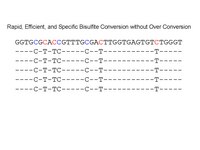S7847 Sigma-AldrichCpGenome Turbo Bisulfite Modification Kit
The CpGenome Turbo Bisulfite Modification Kit is designed to simplify & streamline the bisulfite modification process. In just 90 minutes go from DNA sample to bisulfite converted DNA ready for analysis.
More>> The CpGenome Turbo Bisulfite Modification Kit is designed to simplify & streamline the bisulfite modification process. In just 90 minutes go from DNA sample to bisulfite converted DNA ready for analysis. Less<<Recommended Products
Overview
| Replacement Information |
|---|
| Description | |
|---|---|
| Catalogue Number | S7847 |
| Trade Name |
|
| Description | CpGenome Turbo Bisulfite Modification Kit |
| Overview | The CpGenome Turbo Bisulfite Modification Kit is designed to simplify and streamline the bisulfite modification process. This kit contains all key reagents for bisulfite modification to allow for the recovery of modified DNA in about 90 minutes as compared to 3-16 hours for similar kits. This rapid, but effective approach employs a proprietary mixture of modification reagents to permit shorter conversion times. This unique mixture of reagents allows for complete conversion of unmethylated cytosines while minimizing damage to the input DNA. After modification, and desulfonation, the modifed DNA is purified and eluted using the provided spin columns resulting in purified, bisulfite-modifed DNA that is ready to use in a wide variety of downstream applications. Key Features
|
| Materials Required but Not Delivered | Equipment and Supplies
Reagents
|
| Background Information | Methylation of cytosines located 5' to guanosine is known to have a profound effect on the expression of many eukaryotic genes. In normal cells methylation occurs predominantly in CG-poor regions, while CG-rich areas, called CpG-islands remain unmethylated. The exceptions are the extensive methylation of CpG islands associated with transcriptional inactivation of regulatory regions of imprinted genes and genes on the inactive X-chromosome of females. Aberrant methylation of normally unmethylated CpG islands has been documented as a relatively frequent event in immortalized and transformed cells and has been associated with transcriptional inactivation of defined tumor suppressor genes in human cancers. Several methods have been developed to determine the methylation status of cytosine. These include the use of antibodies or protein methyl binding domains, digestion with methylation sensitive, insensitive, or dependent restriction enzymes as in restriction landmark genomic scanning (RLGS), oligonucleotide array hybridization, bisulfite genomic DNA sequencing and Methylation Specific PCR (MSP). Genomic DNA sequencing, although time consuming and labor intensive, offers a more universal detection method. MSP is an established technology for the monitoring of abnormal gene methylation in selected gene sequences. Utilizing small amounts of DNA, this procedure offers sensitive and specific detection of 5-methylcytosine in promoters. It is being exploited to define tumor suppressor gene function, and to provide a new strategy for early tumor detection by interrogating DNA derived from tissues and bodily fluids. The initial step of both bisulfite genomic sequencing and MSP is to perform a bisulfite modification of the DNA sample. In the bisulfite reaction, all unmethylated cytosines are deaminated and sulfonated, converting them to uracils, while 5-methylcytosines remain unaltered. Thus, the sequence of the treated DNA will differ depending on whether the DNA is originally methylated or unmethylated. Also, the initially complementary DNA strands will no longer be complementary after cytosine conversion. Primers for use in MSP can be designed to specifically amplify either a bisulfite-sensitive, unmethylated strand or a bisulfite-resistant, methylated strand, based upon these chemically-induced differences. Millipore offers a selection of CpG Wiz® MSP kits to enable gene-specific analysis by MSP. To learn more about CpG Wiz kits and MSP technology Click here |
| References |
|---|
| Product Information | |
|---|---|
| Components |
|
| Quality Level | MQ100 |
| Applications | |
|---|---|
| Application | The CpGenome Turbo Bisulfite Modification Kit is designed to simplify & streamline the bisulfite modification process. In just 90 minutes go from DNA sample to bisulfite converted DNA ready for analysis. |
| Application Notes | For MSP primer design, please use the MethPrime software package. Click here |
| Biological Information |
|---|
| Physicochemical Information |
|---|
| Dimensions |
|---|
| Materials Information |
|---|
| Toxicological Information |
|---|
| Safety Information according to GHS |
|---|
| Safety Information |
|---|
| Storage and Shipping Information |
|---|
| Packaging Information | |
|---|---|
| Material Size | 50 reactions |
| Transport Information |
|---|
| Supplemental Information |
|---|
| Specifications |
|---|
| Global Trade Item Number | |
|---|---|
| Catalogue Number | GTIN |
| S7847 | 04053252746826 |
Documentation
CpGenome Turbo Bisulfite Modification Kit SDS
| Title |
|---|
References
| Reference overview | Pub Med ID |
|---|---|
| Characterization of induced tissue-specific stem cells from pancreas by a synthetic self-replicative RNA. Miyagi-Shiohira, C; Nakashima, Y; Kobayashi, N; Saitoh, I; Watanabe, M; Noguchi, H Sci Rep 8 12341 2018 Show Abstract | 30120295
 |
Brochure
| Title |
|---|
| Advancing cancer research: From hallmarks & biomarkers to tumor microenvironment progression |
| CpGenome™ Turbo Bisulfite Modification Kit |
Technical Info
| Title |
|---|
| White Paper - The Message in the Marks: Deciphering Cancer Epigenetics |
User Guides
| Title |
|---|
| CpGenome¿ Turbo Bisulfite Modification Kit (50 Reactions) Manual |









